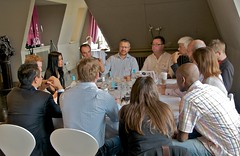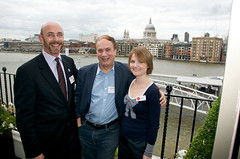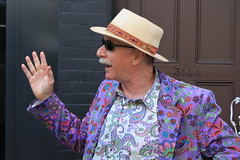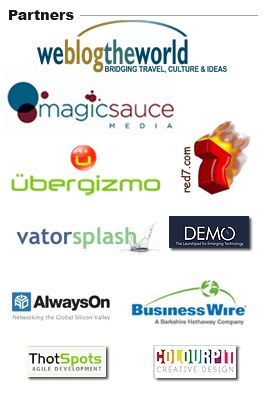About Us
Traveling Geeks is a consortium of entrepreneurs, thought leaders, authors, journalists, bloggers, technology innovators and influencers who travel to countries to share and learn from peers, governments, corporations, and the general public to educate, share, evaluate, and promote new, innovative technologies. The initiative was founded by Renee Blodgett and Jeff Saperstein in 2008.
Trips are funded by sponsorships from corporations, organizations and governments. The first tour was sponsored by the Israel Ministry of Foreign Affairs, a trip that successfully marked the proof of concept that could expand to other countries around the world.
Read MoreUK Diary: Friday – Looking For Ghosts In Peterhouse College Founded 1284
http://www.youtube.com/watch?v=t8z7odjIZdw
After a hard-packed day of visiting with Cambridge startups, government agency representatives, Cambridge tech incubator, meeting with Nokia research labs, meeting with Microsoft Research Labs – and punting on the river Cam, the Traveling Geeks are invited to dinner at Peterhouse College.
According to my excellent guidebook “Cambridge Colleges” by Janet Jeacock, Peterhouse College features one of the finest collections of Pre-Raphaelite stained glass, by Morris, Burne-Jones, and Madox Browne. It is the oldest of all 31 Cambridge University colleges, founded in 1284.
As the rest of the TGers are shmoozing on the lawn, my son Matt and I explore the building. We’re hoping to find some ghosts. Please see the short video above.
Next: More Cambridge innovation. . .
Cambridge Traveling Geeks TweetUp #TG2009
We had the most gorgeous setting for a TweetUp ever, arranged by Karyn Barnes of East of England. Thank you, Karyn!
Below are a few choice photos and links to larger sets. If anyone else has photos, please let me know.
Flickr Set from Susan Bratton
http://www.flickr.com/photos/luvlotus/sets/72157621345333391/
Flickr Set from Mark Littlewood
http://www.flickr.com/photos/39952434@N04/sets/72157621295932914/
Leading Memory Lane
I had an interesting chat at the TechCrunch Europe Awards with Sven Hock of Kingston Technology Company.
They’re over twenty years old and tout themselves as the world’s independent memory leader. Kingston offers more than 2,000 memory products that support nearly every device that uses memory, from computers, servers and printers to MP3 players, digital cameras and cell phones.
Kingston also provides contract manufacturing and supply chain management services for semiconductor manufacturers and system OEMs.
Life in London: Does Fun Have an ROI?
I did very little blogging while I was in London, but it wasn't because I didn’t find anything interesting to write about. It’s because I was talking, laughing, eating or drinking nearly every moment of my two-week trip. I proudly announced to my husband that I hadn’t taken a single Ambien during the visit. Unfortunately, it wasn't because of some no-jet-lag magic, it was because I only got about two hours of sleep a night.
Every time I visit London I find a city with zero downtime filled with entrepreneurs, investors and the like who are offering to take me for afternoon tea or a drink to talk about the industry or well, just talk into wee hours of the morning. One Oli Barrett even serenaded me with several songs from Mary Poppins and Chitty Chitty Bang Bang late after the TechCrunch Europa awards. After all, that’s how we Americans all think the British talk, right? That’s pretty accommodating stuff.
And look no further than these pictures to see how much fun Scoble was having. Even Last.fm had a sense of humor when a TechCrunch editor stormed their offices somewhat unannounced. (Michael Arrington? Less of a sense of humor about that post. Sorry, Mike.) People are intense about their companies, but there’s a sense in the UK that it’s not the only thing that matters.
The joviality is all the more surprising given the rough times UK start-ups are having, as I detailed today on TechCrunch. Money available for early stage start-ups is perilously low and good many entrepreneurs I know have already closed their companies or sold them on the cheap. But here they are all still hanging out, supporting one another, having wild parties and enjoying life. It’s as if (gasp!) the world doesn’t revolve around the Internet.
As a business reporter, I’m of two minds on whether this is a good thing or a bad thing. I’m a big believer that there’s no such thing as work-life balance when it comes to start-ups—a view that frequently gets me in trouble especially when I’m talking about why there aren’t more women in the business. But sometimes the Valley takes the macho-look-at-me-working-24-hrs-a-day thing too far. Startup or no, I’m not sure I know anyone who works just 40 hours a week here, and I know I don’t know anyone who isn’t checking their email every minute of the day. The debate about whether that’s healthy is one thing—but does it actually make us more successful?
How are the US and UK Different in Our Approach to Social Media? #TG2009
Here’s an interview done at Econsultancy in London where they asked me about the differences between the US and UK with regard to start ups, innovation, and social media.

- Image by SusanBratton via Flickr

- Image by jdlasica via Flickr

- Image via CrunchBase

- Image by jdlasica via Flickr
Natural Language Oracle – True Knowledge: New Search Technology from Cambridge #TG2009
Last week in Cambridge, the Traveling Geeks met William Tunstall-Pedoe of True Knowledge.
True Knowledge bills itself as a question answering service — a more refined online search service.

- Image byTrue Knowledge/True Knowledge
via CrunchBase
Instead of searching for words, you ask questions in natural language, and instead of getting a list of internet pages that may contain what you’re looking for, you get a concise direct answer. According to William, this is similar to Ask.com, but instead of human intervention, they’ve come up with new algorithms and data feeds that can automate the question-search.
True Knowledge has a huge database of facts (170 million and counting). For searchers, this translates into a powerful online personal assistant answering simple questions like When was Barak Obama born? and much more complicated ones like Who has been president of the US since John McCain was born? and How far is London from Michael Jackson’s birthplace? that require True Knowledge to deduce information based on the facts it knows.
True Knowledge has a free Firefox extension called Google Enhancer. After you install it, every time you search for something on the top search engines (Google, Yahoo!, Bing, and Ask.com), the extension will also ask True Knowledge what you searched for and show you the results:
Here are photos of the TweetUp and the luxurious interiors of the Fitz.
Here is a photo of William and I at the Cambridge TweetUp at the Fitz Museum.
You can keep in touch with True Knowledge via their blog and @trueknowledge on Twitter.
Related articles by Zemanta
- True Knowledge Opens API (gigaom.com)
- trueknowledge.com (brianwmackay.blogspot.com)
- True Knowledge’s Semantic Answer Engine Now Offers an Open API (ostatic.com)
- Universal Answer Engine (arnoldit.com)
- Searching for another Google (bbc.co.uk)
In the MOO’d to be Creative? Richard Moross Has Some Fun Ideas for You #TG2009
While in London last week, I had the delightful opportunity to meet the founder and CEO of Moo.com. If you haven’t seen all the great things you can create with your images and Richard’s printing capabilities, you should click below to check out the options.

- Image by brianjmatis via Flickr
Related articles by Zemanta
- Interview with the Financial Times (richardmoross.com)
- MOO in Printing News (richardmoross.com)
Howard Rheingold on 21st Century Literacy Skills at #RebootBritian #TG2009
I had the good fortune to travel for a week with Howard Rheingold as part of our Traveling Geeks contingent to England. Being with him 24/7 is delightful. He rolls with the natural hiccups of travel, is cordial to one and all and is a deep thinker about the human condition as it meets the online world.
Howard’s keynote at Reboot Britain was his first pass at a new group of practices he believes are crucial skills for success in today’s online world.
Check yourself and see which you possess and where you can improve.
The five main skills, according to Howard are:
- Attention
- Participation
- Cooperation
- Critical Consumption
- Network Awareness

- Image by SusanBratton via Flickr
Howard purports and I agree, that school is no longer enough to educate our students. If you’ve listened to my DishyMix interviews with Alvin Toffler, author of FutureShock and Revolutionary Wealth, Marcus Buckingham, author of The Truth About You or Sir Ken Robinson, author of The Element, you know I believe our schools are failing our children.
This presentation hit home for me as a litmus test to both my personal skills as well as those of my daughter. Howard says learning is happening outside the classroom via participation with others, including via online gaming and socnet interaction. He says that “being an active citizen has values on many levels that support learning.” As I’ve said before, passive consumption is no longer enough.
First there’s attention. In a world of multi-tasking and content snacking, we must continue to pursue focus. It’s a required skill. How is your attention span?
Next are Participation and Cooperation. Howard points to the value of online collective action and collaboration as trends happening now in which we should participate. Here’s my post on next generation collaboration tools. Are you taking advantage of these online tools to fix problems, change the world or just work more efficiently? Your children will be, if they are smart.
Next is Critical Consumption, or as Howard calls it, taking a page from Ernest Hemingway, “Crap Detection.” He rails at the lack of critical thinking being taught in schools today. If we induce children to challenge authority by teaching them critical thinking, we won’t be able to control them in school. Now that anyone can post anything online, everyone must develop scrutiny, fact-checking, rational thought and critical thinking. Is that Wikipedia entry true? Did USA Today fact check that story? Doubtful on both counts.
Crap Detection 101 by Howard Rheingold
Finally, there’s Network Awareness. Who do we know? Who are we leveraging? Are you taking advantage of social networking tools to stay connected and grow your connections? A small number of distant connections has been proven to significantly empower one’s network. Are you proactive in your approach to online networking? Are you using it for good?
I’d love to hear your thoughts on these or other skills you think are critical for our real-time, web-connected, networked world.
Related articles by Zemanta
- Do You Think Futurists Are the Smartest of All Thinkers? (blogs.personallifemedia.com)
- What to Learn: ‘Core Knowledge’ or ’21st-Century Skills’? (downes.ca)
- Critical Thinking in the Classroom (downes.ca)
UK Diary: Friday – Cambridge – The Innovation Capital Of Europe
![]()
It’s Friday Morning and it’s an early 7.30 am start for the Traveling Geeks…
JD Lasica is the unsung hero of the Traveling Geeks. He has invested hundreds of hours in organizing this trip.
By Friday morning, his normal patience-of-a-saint is evaporating as he attempts to herd the TG cats into a coach that is far smaller than expected.
Plus, my son is with me this morning so space is even tighter. And on top of everything, last night was a late night and we are all still a little groggy from the grog and the good times at the Europa Awards (please see: ).
Soon, however, we are on our way to Cambridge and the start of another jam packed day. It’s a gorgeous day, not too hot, as we drive through the English countryside, the yellow and green fields and billowing clouds set against an azure sky.
It doesn’t take long before we are in the Pitt Building in Cambridge, the site of Britain’s oldest publisher. And the very impressive Sherry Coutu is running a very tight meeting with presentations from several government agencies and university representatives.
Next: Another panel and we meet Cambridge startups…
Ducklings!
On the River Cam, Cambridge UK, with the Traveling Geeks.





![Reblog this post [with Zemanta]](https://img.zemanta.com/reblog_c.png?x-id=f47b6592-ba96-48cb-8320-e8acb0dffc6a)
![Reblog this post [with Zemanta]](https://img.zemanta.com/reblog_c.png?x-id=5045bb61-b33b-44ba-ac01-be105b3e929c)



![Reblog this post [with Zemanta]](https://img.zemanta.com/reblog_c.png?x-id=71538024-4fe6-466c-9ce4-640f00671310)

![Reblog this post [with Zemanta]](https://img.zemanta.com/reblog_c.png?x-id=cb02215f-cdb8-435b-b771-0fa768ef852c)



![Reblog this post [with Zemanta]](https://img.zemanta.com/reblog_c.png?x-id=b033af23-6a01-44c7-b146-cbb5ac93a889)
